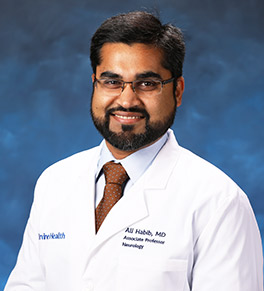Clinical trial targets antibodies to treat rare form of myasthenia gravis

“We are in the early stages, but our hope is to bring about improvement while limiting side effects and perhaps one day gain the ability to eliminate the disease,” says neurologist Dr. Ali Habib of a first-in-human clinical trial at the UCI Alpha Clinic for a rare form of myasthenia gravis.
UCI Health neuroscientists are investigating a unique cellular therapy to precisely target a rare form of myasthenia gravis, an autoimmune disease that causes disabling muscle weakness and fatigue.
The therapy involves the use of genetically modified immune cells to attack only antibodies responsible for MuSK myasthenia gravis, a more severe form of the disabling neuromuscular disorder, says Dr. Ali A. Habib, the principal investigator of the first-in-human study at the UCI Alpha Clinic, the clinical trials arm of the UCI Sue & Bill Gross Stem Cell Research Center. The Alpha Clinic is one of only five U.S. locations participating in the phase 1 trial.
Myasthenia gravis (MG) is a chronic disease that leads to weakness in the body's skeletal muscles and affects as many as 60,000 Americans. It is challenging to treat, says Habib, a neurologist with the UCI Health ALS & Neuromuscular Center, but he believes the therapy, called MuSK-CAART, may lead to more effective treatment for all types of the disease.MuSK MG — muscle-specific tyrosine kinase myasthenia gravis, which affects 5% to 8% of all MG patients — primarily targets muscles in the head and neck, resulting in difficulties speaking, swallowing and even breathing. Flare-ups can be life-threatening. The few treatments now available for generalized MG also suppress the immune system but they don’t work as well for MuSK MG.
More concerning is that current MG treatments “are the equivalent of carpet bombing,” Habib says. “They destroy the problematic immune cells but also ones that protect the body from bacterial infections and diseases, such as COVID-19. This clinical trial involves destroying only the cells that cause the disease, which we hope will be associated with fewer and milder side effects."
Customized CAR T-cell therapy

Developed by Cabaletta Bio, MuSK-CAART is based on chimeric antigen receptor (CAR) T-cell therapy, which harnesses the body’s existing disease-fighting cells. CAR T involves removing white blood cells, genetically programming them to recognize and attack a specific type of disease-causing cell, then infusing the patient with the modified cells.
The MuSK-CAART therapy is even more precise. The extra "A" stands for autoantibody, the type of immune cell that causes MuSK MG. In this case, a patient’s white blood cells are modified to selectively remove only those cells that cause MuSK MG, leaving other immune cells intact.
“We are in the early stages, but our hope is to bring about improvement while limiting side effects and perhaps one day gain the ability to eliminate the disease,” says Habib.
Two decades of experience treating myasthenia gravis
The trial is expected to enroll a total of 24 adults at UCI Medical Center in Orange and locations in Sacramento, Portland, Ore., Kansas City, Kan., and Chapel Hill, N.C. It is designed to test the safety and dosing of the therapy over a period of six years.
Habib is particularly proud that the Alpha Clinic and the ALS & Neuromuscular Center team were selected by the Philadelphia-based biotechnology company to participate in the first-of-its-kind investigational study. It is one of several such firsts for the Alpha Clinic and the ALS team.
They opened the first clinical trial using CAR T-cell therapy to treat an autoimmune disorder and in a landmark paper published in June, the Descartes-08 therapy marked the first successful use of RNA cell therapy to treat generalized MG.
“We are the only Southern California center involved in the MuSK-CAART trial and we have more than two decades of history conducting myasthenia gravis clinical trials. We also have amazing collaborations with our hematology, oncology and transplant medicine teams, which are very experienced with cell-based and CAR T therapies.”
The ALS center treats a range of neuromuscular disorders, including muscular dystrophy, Lou Gehrig’s disease and myopathies. The center's specialists also are leading several other first-of-a-kind clinical trials for inherited muscle disorders such as Pompe disease, myotonic dystrophy and amyotrophic lateral sclerosis (ALS).
For more information about the MuSK-CAART trial, contact the Alpha Clinic at stemcell@uci.edu or 949-824-3990.
The UCI Alpha Clinic and the UCI Sue & Bill Gross Stem Cell Research Center are part of a network of the leading medical centers funded by the California Institute for Regenerative Medicine. The Alpha Clinic specializes in delivering leading-edge stem cell clinical trials and gene therapy to patients, and it seeks to accelerate the development of new treatments through partnerships with patients, medical providers and clinical trial sponsors. Visit stemcell.uci.edu to learn more about clinical stem cell trials and regenerative medicine research.




